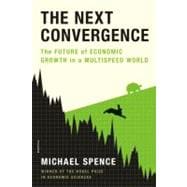
Note: Supplemental materials are not guaranteed with Rental or Used book purchases.
Purchase Benefits
What is included with this book?
Michael Spence is a Professor of Economics at the Stern School of Business at New York University, a senior fellow at the Hoover Institution, and was the chairman of the independent Commission on Growth and Development. Winner of the Nobel 2001 Prize in Economic Sciences, he lives in California and Italy.
“Contrary to his book’s title, Nobel Prize–winning economist Spence does less prognosticating than one might expect. Indeed, early on he shares a chart showing just how inaccurately economists predicted growth during the 1990s. Instead, he offers a comprehensive summary of the forces at play in today’s global economy: removal of trade barriers, the lightning-fast transfer of knowledge from developed to emerging economies, global demand, resources, the role of national and international governments, and the management (or not) of currency rates, among others. Spence’s style is pretty flat (Where’s John Kenneth Galbraith when we need him?), and he seems to underestimate the looming role of climate change in any economic scenario. Yet his status report could give attentive readers a more empowered role in their own economic future.”—Alan Moores, Booklist
“The emergence of China is just part of an amazing catching up process going in the world. We all feel this profound change, but few of us have the ability to step back, put it in perspective, analyze the past and guess where the future is taking us. Mike Spence has it, and he delivers. This is serious thinking, on essential issues. I learned a lot from the book, both in the small and in the large; I am sure other readers will as well.” —Olivier Blanchard, IMF Chief Economist and Class of 1942 Professor Economics, MIT
“Among economists, common sense is not that common. Fortunately, Michael Spence has long bucked the trend. In this book he dispenses wisdom on economic growth – and much else – in accessible, bite-sized chunks. The world’s policy makers better listen.” — Dani Rodrik, Rafiq Hariri Professor of International Political Economy at the John F. Kennedy School of Government, Harvard University
“I always knew that Mike Spence was a terrific economist. After reading this book I realize that he also has the rare ability to see the world economy—all of it, rich and poor—with clarity, reason and empathy. If you are looking for a lucid, readable, consistent, unprejudiced picture of what has been happening and what might happen next in the world economy, this is an excellent place to find it.” —Robert Solow, winner of the 1987 Nobel Memorial Prize in Economic Sciences
The New copy of this book will include any supplemental materials advertised. Please check the title of the book to determine if it should include any access cards, study guides, lab manuals, CDs, etc.
The Used, Rental and eBook copies of this book are not guaranteed to include any supplemental materials. Typically, only the book itself is included. This is true even if the title states it includes any access cards, study guides, lab manuals, CDs, etc.
As the global economy emerged in the post war period, the colonial system disappeared. Old colonies became new countries, some of them with very odd shapes and geographical positions. With no history of self-governance as nation states, they struggled to find their way, economically and in terms of stable governance. India created the world’s largest and most complex democracy—a modern miracle. China turned to communism, adopted the centrally planned model of economic organization, and made very little measurable economic progress for 29 years, but perhaps sowed the seeds of its future rise by educating the vast majority of its people. It dramatically changed direction in 1978 and became the largest (in population) and fastest growing country in the history of the world.
What no one saw clearly was that in the post war period, the economic party that had been running for 200 years in a small subset of the population was about to spread to much of the rest of the world.
The implications of this new convergence are profound and extensive. The costs of things will change. Goods and services that require human time and effort will become relatively more expensive, an inevitable consequence of the eventual decline of low cost underemployed labor in the global economy. Economic forces and incentives will try to make them less expensive by allocating more capital to labor and hence reducing the labor input required. But there are limits to substituting capital for labor, though these limits are moving as technology changes the art of the possible. The abundance of underemployed labor in the world economy has in a sense delayed the arrival of labor saving technology. But this will end in the current century.